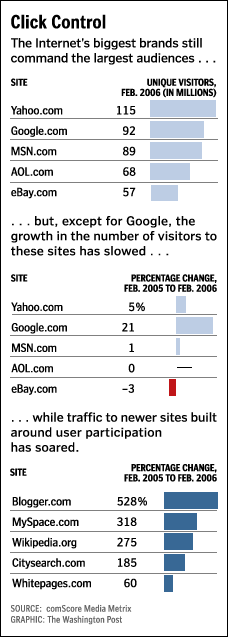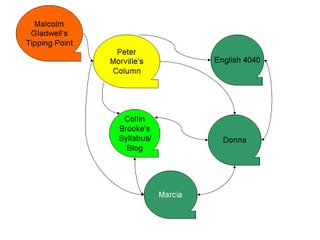Blogs in the News: Blogging then and now
Earlier this month, there was an article in the Washington Post about net-surfing trends.
"Google Inc., for instance, bought Blogger.com in 2003; the number of people posting or reading material at that site jumped to 15.6 million last month from 2.5 million a year ago."

Yes that's a 528% increase, as you can see on the table here.
And that doesn't even include the people who don't use Blogger or reference other blogs than Blogspots. I'm thinking, ok, great, so people are really into blogging now. But as we've learned in this class, it's not so much what you write as what you read that can adjust the blogosphere.
What are the top blogs these days? Well the top ten, according to Technorati are:
1 Boing Boing: A Directory of Wonderful Things
By xenijardin.
2 Engadget
3 PostSecret
PostSecret is an ongoing community art project where people mail in their secrets anonymously on one side of a homemade postcard.
By frank warren.
4 Daily Kos: State of the Nation
5 The Huffington Post
By Arianna Huffington.
6 Official Google Blog
7 Instapundit.com
8 Michelle Malkin
By Michelle Malkin.
9 Thought Mechanics
By Theron Parlin and Matthew Good.
10 Blog di Beppe Grillo
Grillo's gags have tackled financial scandals and political corruption
By Beppe Grillo.
I have no clue what Blog di Beppe Grillo is, but I do see that at least half of the top 10 are politically driven blogs.
Frankly, I have this strange obsession with Instapundit.com, and how it somehow gets to have the first and last word with the surfing public. Sooo many people read it. I read it. What does this say about us as a nation? At least it means we care about politics a little, and I don't blame anyone for wanting to stay away from CNN and Fox News because they dilute their news so much. But it also means we assign authority to some bloggers to dish out news we then take as fact. I know we've talked about this in class before, too, but again, how much power does that give the bloggers whose sites get the most hits? After all, it seems they shape the common knowledge.
One example of this is the Baghdad Blogger, Salam Pax (a pseudonym). Salam's blog, Where is Raed? was one of the most popular blogs during the initial attack on Iraq in 2003. Salam is (allegedly) a gay Iraqi architect/translator who started his blog so a friend in Jordan could be up on his status while the country was under seige. His site was so popular that when he stopped posting suddenly there was an international uproar about what happened to him, whether he was hurt, or kidnapped, etc. It turns out he didn't have electricity and had to keep writing entries on paper, to post electronically later. During his absence on the Web, however, it became clear that many people were reading his site to get firsthand news of the region. Surfers looked at his reports as they would those from CNN, BBC and other news networks.
His wild popularity has led to a book deal, a movie deal, and wide critical-acclaim. Well, except for those who think Salam Pax and his blogspot is a scam from the US govt to broadcast propaganda. I don't see how that can really be the case, though, since in a few of his posts, he basically tells the Americans off.
What do you think about a blogger capitalizing this way? Is it good? Is it a sell-out?
More interesting to me than that is something my International Relations professor said the other day in a lecture on Public Opinion:
"Americans either have no opinion on our [foreing] policy, or they have contradictory views. Meaning, they say they want US troops to come home, but they aren't willing to sacrifice stability in the Middle East at this point. And apparently we also want increased federal support for government programs, but we don't want any increases in taxes... It is a tragedy that the citizens of this country don't offer a clearer view for the government officials to follow with better policy."
Obviously, not everyone is reading polarizing sources like the Daily Kos or Where is Raed? Or Pax's other blog Shut up you fat whiner! I'm even going to go out on a limb here, and say that the real reason for the 528% increase on Blogger.com, is not due to new classical blogs, which focus on linking and networking on national events, but instead due to web journals on MySpace.com for example.
In fact MySpace has been in the news recently too. A week after the Washington Post article, there was a (rather long) story on NPR's All Things Considered that I found intriguing. MySpace.com, one of the most surfed-to sites on the net, is hiring net-security against child molesters or stalkers. The story was covered by the BBC, too. Why such a big deal? Because MySpace is annoying, but it attracts millions of people. People who are now using the built-in blogging tool. For better or for worse.
Still, though I shudder to think about all the people out there calling web journals "blogs", it does open up the imagination to what the blogosphere will evolve into next.
Again from the Washington Post article on trends in blogging:
"'The growth in blogging reminds us the Internet is fulfilling its original promise about participation,' said Gary Arlen, a research analyst and president of Arlen Communications Inc. 'This medium empowers users in such a way that they can do what they want and be heard.'"
Blogging is changing, with so many new people expanding the field and different ideas of posts as newsworthy, credible sources. For now I'll choose to be hopeful that blogging will retain its authenticity as a reasonable educational network as it expands. But I also believe that future wholly depends on MySpace's success in policing the molesters and in the public's willingness to revise its definition of and subscription to future blogs. It's hard to say whether the new generations of bloggers will contribute to the global opinion as much as Salam Pax and other classical bloggers, since they may be too busy contemplating their own navels. I guess the question is where is the Next Raed?
cross-posted from Post-December




